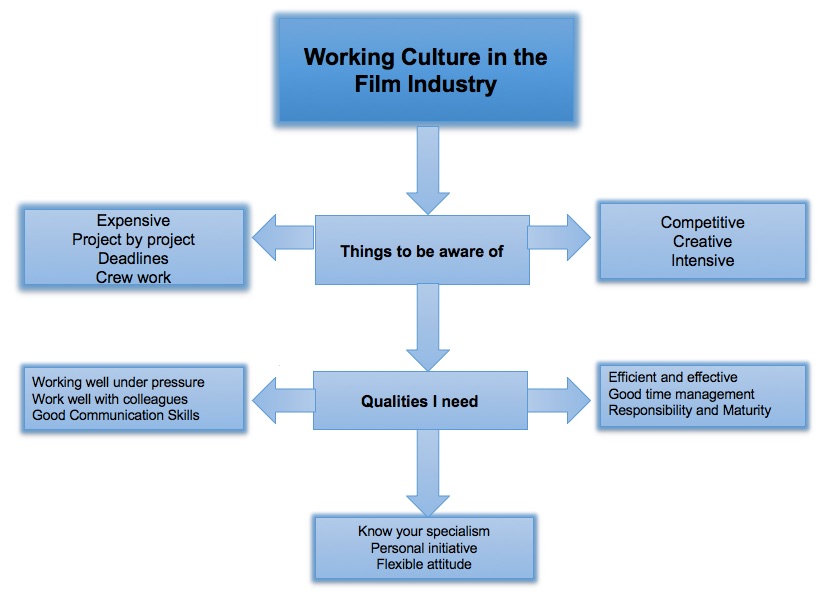2.1 Explain the working culture of the film industry
 Working in a film industry you’re always under pressure because nothing can go wrong or otherwise you’re wasting a lot of money that leads being behind schedule in fixing the problem. Working in a film industry they expect you to be professional and always have a good time management.
Working in a film industry you’re always under pressure because nothing can go wrong or otherwise you’re wasting a lot of money that leads being behind schedule in fixing the problem. Working in a film industry they expect you to be professional and always have a good time management.
Time management is they key importance to have this job, because nothing can go wrong on a shooting day. In every film industry when they hire a freelance they need to be always focused, responsible, professional, have good communication skills, and most importantly very organised and work well with others, because all these qualities are needed in the world of film industry otherwise things won’t go as well as it can turn out.
What I’ve learnt of the working culture of the industry from masterclasses and working on Incubus is that its long days for shoot, its high pressure and hard work. You need to be well prepared, have good time management skills, be professional but also be someone who is fun to work with and easy to get along with. Because you work from one project to the next you want to make sure that you make a good impression so that you can progress further in the film world and get more opportunities and build up your experience.
2.3 Potential progression routes into the film industry and wider sector
Progression Routes – Group Research
Learn
Universities give a number of courses that give that benefit your knowledge in film and TV, they provide in depth lessons on techniques while use the most modern of equipment.
The BFI can also give courses in the watershed and Christchurch studios, and also provides residentials in such department as animation, documentaries, sfx effects and short film construction where students can spend a number of days focused on developing skill and focusing on a project. Other sources of such as old vic theatre school, which produces articles about films.
Outside of education is a free alternative such as online tutorials from other experienced producers, which are most commonly based on websites such as YouTube and other educational websites.
Training is another way to learn in film, organisations like the BBC, channel 4 and ITV provide production apprenticeships. These areas may consist of a mentor to guide you through your training.
A completely independent route is learning through trial and error, many independent film makers that immediately start to make films often learn and develop from their past mistakes, this route is effective as it allows film creators to develop their own style while creating a sense of self reliance but can be very time consuming.
Master classes allow professionals from the industry to come and discuss their experiences within the industry to an audience, this is useful as it allows the viewer to engage with a lot more personal experience of what the film industry is like and how to break into it.
Network
Online Networking
Online networking is becoming more and more prevalent and accessible, and can be a great opportunity to meet like-minded filmmakers, as well as source crew, cast and equipment. The BFI NETWORK offers online opportunities to network and advertises for BFI events. There are also a variety of local and national Facebook groups to network online as well.
BFI Networking Opportunities – Events and Professional Development
https://network.bfi.org.uk/news-and-features
Facebook Networking Groups
https://www.facebook.com/groups/bristolunitedfilmmakers/
– Casting Calls
– Equipment for Sale
– Crew
https://www.facebook.com/groups/bfifilmacademy/
https://www.facebook.com/bfifilmacademy/
https://www.facebook.com/BfiFilmAcademyBristol/
– group for national BFI alumni and members
– group for Bristol BFI members
– employment/training and network opportunities
https://www.facebook.com/creativeskillshub/
– opportunities for training and mentoring
Film Festivals – Volunteering
By volunteering at film festivals, it can be a great opportunity to meet other young aspiring filmmakers who are also volunteering, as well as potential opportunities to network with filmmakers who are attending the event to talk on panels or have their films screened.
Encounters, Bristol
https://encounters-festival.org.uk/
Into Film, Nationwide (Youth Orientated)
BFI Future Film Festival, London (Youth Orientated with multiple networking events)
https://www.bfi.org.uk/education-research/education/bfi-future-film
Bristol Radical Film Festival, Bristol (Political Film Orientated)
Film Bath, Bath
BFI List of Film Festivals for Young People
https://www.bfi.org.uk/education-research/bfi-film-academy-scheme/film-festivals-young-filmmakers
Watershed List of Film Festivals in the South West
https://watershed.co.uk/filmhub/membership/film-festivals/
BFI London Film Festival, London
https://whatson.bfi.org.uk/lff/Online/default.asp
BFI Flare, London (LGBTQ+ orientated)
https://whatson.bfi.org.uk/flare/Online/
Networking Events
You can also attend specified networking events to meet other filmmakers and potential representatives of funding bodies.
Creative England – Be More Bristol
http://creativeengland.co.uk/events/be-more-bristol
Creative England Live
http://creativeengland.co.uk/events/creative-england-live-2018
Film London, Networking Events
http://filmlondon.org.uk/industry
Work
There are lots of different ways to get into the industry for you to you work.
entry level jobs :
There are many jobs at entry level which you can get into such as Floor Runner, Set Assistant, Floor Assistant, Assistant Directors and Script Writers. You can also have Work Experience such as work experience in production. There is many trainee jobs such as a department trainee, Camera Operators, Costume and Set designers. Another way to get into the film and media industry is through being Admin for a company.
production companies :
- BBC
- Doghouse studios
- Bottleyard
- Aardman
- Films at 59
- Omniproductions
- Icon Films
- Farmstudios
- Happy hour productions
- Humble bee films
- Off-the-fence production
- Silverback film
Post-production houses
- evolutions
- Doghouse studios
- Wounded buffalo
- Films at 59
Internships
internships are based on gaining experience. You can get internships at places such as RIFE, as well as emailing a variety and asking for things which are not advertised. These are available at lots of times throughout the year – for example, summer internships. Internships as a post-production runner, with the company BAFTA for example as Production and with Women In Film And Tv are available to name a few. These can be valuable when applying for different positions and give you experience which you won’t get anywhere else.
Apprenticeships
You can get apprenticeships at many big name TV companies, such as BBC, Channel 4 and ITV. In BBC, the apprenticeships are split into 4 sections, Production, Technology, Journalism and Business, and you can then choose what you want to do amongst these choices. In addition, there are lots of apprenticeships in independent companies or doing things. like Digital Marketing and social media.
Create
In our group, we discussed the creative ways which our film could be shared and made and the different platforms that could be used to share our work. One of the things we thought about is how we could share our content using the media. Online networking has many different types of platforms which people are able to share their films and different types of media they have made such as YouTube and Vimeo. Facebook and Twitter are also good ways of sharing work which will get noticed by people. Creating an online page similar to a portfolio is also a good way of sharing lots of work at once.
Doing courses and getting contacts of people with a wide range of skills is also a good way that you can do well in the film industry. One way that this can be done is by doing courses such as the BFI and keeping in touch with people who are interested in similar things than you. This will allow you to use these people in projects or in later life.
We discussed how getting a kickstart helps funding and hiring equipment allows you to save money which helps when working in the media industry because it allows you to have more money and also gives you more options to spend money on your project to get it shown. Working at film festivals also allows you to get more money and gives you another option to get your work noticed.
When distributing your work there are many websites such as rife which share media created by people which helps them get noticed. Also attending film festivals let’s you feature your films and meet new people. Watching films is a good way to get inspiration for your work and also gives you ideas that other film makers have used, let’s you have your own opinions and use them in your own way.
Personal Progression Plan
What areas/ specialisms in creative media would you like to work in? In a film industry I’d love to work as a Costume Designer and Make-up designer.
Would you like to further study film / creative media? Yes I’d like to study a film course relating to costume and make-up, but mainly on costume.
What courses interest you? Give reasons
There are courses at pinewood studios, royal welsh university in Cardiff, Bristol Old Vic theatre School, for costume design courses.
What networks will you join? What do you hope to gain from these networks? BFI alumni Facebook network – to get jobs and network with filmmakers.
Learning from Masterclasses






Hi Sophia, this is very good work showing your understanding of the film industry and potential routes to working in film. I wish you every luck with a career in costume – based on your work on Incubus I know you would be brilliant! You have achieved this section to a very good standard. well done.